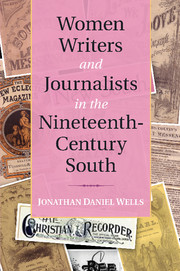Book contents
- Frontmatter
- Contents
- Acknowledgments
- Introduction
- Part One Foundations
- Part Two Women Journalists and Writers in The Old South
- Part Three Women Journalists and Writers in The New South
- 6 New South Periodicals and a New Literary Culture
- 7 Writing a New South for Women
- 8 Postwar Women and Professional Journalism
- Epilogue Women???s Press Associations and Professional Journalism
- Bibliography
- Index
- References
6 - New South Periodicals and a New Literary Culture
Published online by Cambridge University Press: 25 October 2011
- Frontmatter
- Contents
- Acknowledgments
- Introduction
- Part One Foundations
- Part Two Women Journalists and Writers in The Old South
- Part Three Women Journalists and Writers in The New South
- 6 New South Periodicals and a New Literary Culture
- 7 Writing a New South for Women
- 8 Postwar Women and Professional Journalism
- Epilogue Women???s Press Associations and Professional Journalism
- Bibliography
- Index
- References
Summary
In 1876, The People’s Advocate, an African American newspaper published in Alexandria, Virginia, printed an article titled “How a Woman Reads a Newspaper.” Mocking female readers, the newspaper chided them for cherishing “a vague belief that newspapers are the enemies of her sex, and editors its chief oppressors.” “She never reads the headlines … she is greedy for local news, and … marriages and deaths are always interesting reading to her, and advertisements are exciting and stimulating…. Views are of no importance in her estimation, but facts are everything … she reads stories, and sketches, and paragraphs indiscriminately, and believes every word of them.” After such reading, the article claimed, the disappointed woman puts down the paper, convinced that if she only “had a chance she could make the only perfect newspaper the world has ever seen.” Such ridicule heaped on women readers was, of course, grossly unfair, because by 1876 women were clearly not only reading national news, editorials, and highly opinionated columns but writing them as well.
Still, the denigrating tone of the article in The People’s Advocate did stumble upon one truth: that many women did indeed believe that they could produce more interesting periodicals than their male journalistic colleagues. As editors, authors, and readers of periodicals during the Civil War and in the New South, southern black and white women established important precedents for female journalism in which virtually no subject was beyond their purview. From the harshest days of the war to the turn of the twentieth century, these women played central roles in the expanding publishing industry.
Number of New Southern Magazines Undertaken by Year, 1860–1869
- Type
- Chapter
- Information
- Women Writers and Journalists in the Nineteenth-Century South , pp. 122 - 141Publisher: Cambridge University PressPrint publication year: 2011



